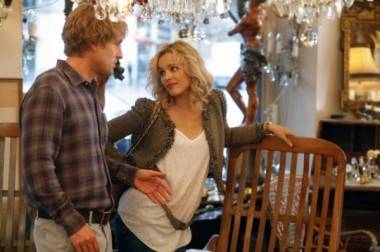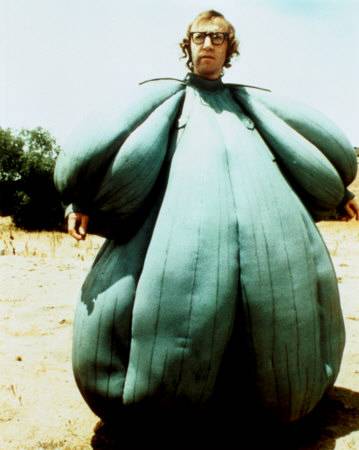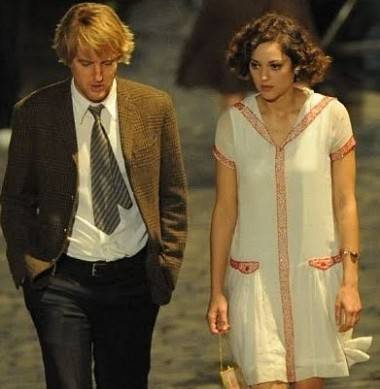Review – Midnight in Paris
– by Regan Payne
There are, I’m sure, many who think of Woody Allen in unflattering, even pedophiliac terms (or worse, as the film-maker behind Whatever Works). What a lot of younger movie-goers might not realize is that Allen began as a gag writer for TV in the 1950s before graduating first to stand-up, then film (and, somewhere in between, a writer of pithy short stories and brief, funny essays).
In the ’60s, Allen bridged two eras of entertainment. The snappy, familiar one-liners of Bob Hope met the psychology of the sexual revolution (see: What’s New Pussycat?), with Allen’s head cemented in the latter, but his feet – his delivery and mise en scene – firmly planted in the past, where people were ultimately more comfortable. Thus, he created the image of a sort of perverse vaudevillian: somewhat modern, while thoroughly familiar.
I re-hash old history only to alert these long suffering early-Allen devotees, that Midnight in Paris, Woody’s 42nd feature film release, is a neutered return to his original, gag-laden form. Though not engaging in the physical comedy, or on-the-nose sexual innuendo from his early films, such as the 1973 classic Sleeper, his latest is as close as Allen gets these days to his remarkable early career, in timing and pace, employing words rather than physical comedy. The story moves quickly, and the characters arrive firmly entrenched in their stereotypes, with little room for growth, save for our leading man.
Owen Wilson plays Gil Pender, a Hollywood screenwriter forlorn over what he feels was a missed opportunity in life: he had visited Paris years earlier, as a budding novelist, but didn’t stay, and chose instead, what he feels now to have been the easier, less-fulfilling route of writer-for-hire for the film studios in soulless California. As many writers have over the years, including Allen himself, Gil romanticizes the Paris of the ’20s, envious of its rich literary and musical traditions – a man born to the wrong era. Wilson is wonderfully cast, perhaps the best iteration of the traditional Woody Allen role we have seen. In truth, Wilson doesn’t have that much to do, but his optimistic eagerness is almost contagious as we progress through a film whose premise could become quite dreary and repetitive if not for a keen guide to string us along.
In an attempt, initially unconscious, to steer clear of his fastidious, type-A fiancé, played by Rachel McAdams, her parents, also present in Paris on business, and his fiancé’s friends (the traditional intellectual snobs familiar to Woody Allen films, here played by Michael Sheen and Alison Pill), Wilson wanders off one evening, alone, into the streets of Paris, hoping to clear his head and perhaps draw inspiration for the novel he is supposed to be writing while vacationing in the City of Lights.
Lost and a wee tipsy, nearby church bells call out midnight, preceding the arrival of an antique car that swings by and scoops Wilson up through the sheer exuberance contained within, replete with raucous, champagne wielding partygoers dressed head to heel from the roaring Parisian ’20s. The ringing of bells being the closest Allen will ever get to CGI time travel – when the bells ring, Wilson is simply transported back in the 1920s, rubbing shoulders with his idols: Ernest Hemingway, Cole Porter, and the Fitzgeralds, among others.
This becomes a nightly excursion for Gil, for two reasons: Hemingway has agreed to pass along his book to Getrude Stein, the best judge of talent he knows, and to be near Adriana, an “art groupie” as Gil calls her, who shuffles from legend to legend as her whims guide her, played by Oscar winner Marion Cotillard.
Everyone in the film, more or less, revels in the past somehow, even those from the past. Just as Gil seeks comfort and refuge in Paris of the ’20s, Adriana desires nothing more than to have lived in the 1890s, the Belle Époque – which is the director’s rather simplistic, but effective, argument: we all pine after the past and what could have been for our meager lives, but it is far more productive living for the now.
Allen is distinctly in his comfort zone with this material (usually his passion for early jazz is limited to opening credit sequences), which is why it all comes off fun, rather than insular. The artists from the ’20s are painted with familiar strokes, that is to say, by the distinctive characteristics each generation of university students comes to know them by: Hemingway’s intensity, Dali’s egoism – the same way Gil sees them.
In fact, the typical drawbacks one would point to, the constant whining of McAdams’ killjoy, or the lack of any true conflict in the Paris of the ’20s, only help the film move along more effectively: we want to get away from McAdams as much as Gil does.
As with the main characters in many of Allen’s recent films, including Vicky Christina Barcelona and You Will Meet a Tall Dark Stranger, Gil’s future is left uncertain. In Midnight in Paris, however, the questions ahead are the exciting, optimistic ones crossed when a person walks away, at least a little, from fantasy, and faces his present circumstances head on.




